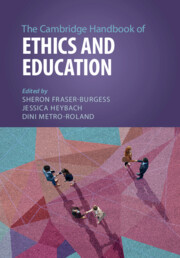Book contents
- The Cambridge Handbook of Ethics and Education
- The Cambridge Handbook of Ethics and Education
- Copyright page
- Epigraph
- Contents
- Figures
- Tables
- Contributors
- Foreword
- Preface
- Acknowledgments
- Part I Traditions in Ethics and Education
- Part II Ethics and Education in Practice
- 15 Why Educate?
- 16 The Displacement of Ethics in Education through Educational Standardization
- 17 School Health Policies and Practices
- 18 Value Creation and Happiness in Education
- 19 Children’s Rights, Childhood, and the Sovereignty of the Good
- 20 School Discipline and the Ethics of Punishment
- 21 Educating All Children
- 22 Decolonizing Curricula
- 23 The Political Necessity and Perilous Ambiguity of “Academic Freedom”
- 24 Teacher Activism and Ethical Speech
- 25 The Specter of Agreement
- 26 Philosophical Reflections on Ethics in Teaching and Teacher Education
- 27 The Ethical Dimension of Educating Educators
- Part III Emerging Ethical Pathways and Frameworks
- Index
- References
21 - Educating All Children
The Legacy of Race in Education
from Part II - Ethics and Education in Practice
Published online by Cambridge University Press: 07 March 2024
- The Cambridge Handbook of Ethics and Education
- The Cambridge Handbook of Ethics and Education
- Copyright page
- Epigraph
- Contents
- Figures
- Tables
- Contributors
- Foreword
- Preface
- Acknowledgments
- Part I Traditions in Ethics and Education
- Part II Ethics and Education in Practice
- 15 Why Educate?
- 16 The Displacement of Ethics in Education through Educational Standardization
- 17 School Health Policies and Practices
- 18 Value Creation and Happiness in Education
- 19 Children’s Rights, Childhood, and the Sovereignty of the Good
- 20 School Discipline and the Ethics of Punishment
- 21 Educating All Children
- 22 Decolonizing Curricula
- 23 The Political Necessity and Perilous Ambiguity of “Academic Freedom”
- 24 Teacher Activism and Ethical Speech
- 25 The Specter of Agreement
- 26 Philosophical Reflections on Ethics in Teaching and Teacher Education
- 27 The Ethical Dimension of Educating Educators
- Part III Emerging Ethical Pathways and Frameworks
- Index
- References
Summary
This chapter asks, How might racial justice be pursued in educational contexts? For example, do racial disparities in quality of treatment in schools require that all students experience the treatment previously reserved for the relatively (racially) advantaged, or should expectations be shifted toward some new standard for all? In order to better engage issues and appropriately address them with a mind to future interventions and continued progress, this chapter argues that it is necessary to clarify the confusions present in much of the discourse surrounding race and educational ethics.
- Type
- Chapter
- Information
- The Cambridge Handbook of Ethics and Education , pp. 443 - 464Publisher: Cambridge University PressPrint publication year: 2024



